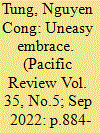|
|
|
Sort Order |
|
|
|
Items / Page
|
|
|
|
|
|
|
| Srl | Item |
| 1 |
ID:
185008


|
|
|
|
|
| Summary/Abstract |
China’s Belt and Road Initiative (BRI) has brought opportunities to its neighboring countries in terms of foreign investment and economic development, while at the same time arousing suspicion in the region regarding Beijing’s intentions. This article analyzes Vietnam’s responses to Beijing’s BRI, with a special focus on the psychological mechanism leading to Hanoi’s subtle confrontation of China and mild resistance of the BRI project. The concept of peace efficacy, which is initiated by the theory of the Balance of Relationships (BoR), is proposed in this article to explain the abovementioned case. Meanwhile, Hanoi’s manipulation of two-handed strategies and seeking a balance between Beijing and Taipei are the other focuses of this article. Vietnam’s deeds, once again, reveal its relational confrontation of China. This article further investigates how Vietnam has sophisticatedly redefined and categorized the BRI and utilized Taipei’s New Southbound Policy (NSP) to suit its own interests; through unofficially strengthening its ties with Taipei, Hanoi is able to ease the pressure arising from Beijing’s assertive policy, display its autonomy and prove its equal, independent status in the international arena.
|
|
|
|
|
|
|
|
|
|
|
|
|
|
|
|
| 2 |
ID:
189254


|
|
|
|
|
| Summary/Abstract |
Like many other small and middle powers, Vietnam is facing a strategic dilemma in the face of the U.S.-China rivalry. With the introduction of a vision for Free and Open Indo-Pacific (FOIP), the US seeks to strengthen ties with its allies and partners in the region to preserve rules-based international order and to counter China’s rise. Being positioned as the U.S. burgeoning like-minded partner in the regional security architecture, how Vietnam responds to the FOIP strategy, hence, merits consideration. This article argues that Vietnam has responded positively toward the FOIP strategy due to the high compatibility between some key tenets of this strategy and its national interests. However, rather than joining and supporting FOIP in a full-fledged way, Vietnam has chosen to work selectively in some issues with the US. More specifically, while Vietnam proactively embraces the economic dimension in FOIP, it still remains cautious about the security domain. The rationale behind Vietnam’s hesitation to lend full support to this strategy is partially driven by China factor. In this article, China is addressed as a “brake,” which can exert influence on the speed and scope of cooperation that Vietnam is willing to move forward with the US under FOIP strategy.
|
|
|
|
|
|
|
|
|
|
|
|
|
|
|
|
| 3 |
ID:
188429


|
|
|
|
|
| Summary/Abstract |
This paper investigates the COVID-19 vaccine diplomacy of the United States and China in Vietnam and conceptualises Hanoi’s practical responses. The deployment of vaccine diplomacy is closely associated with US-China strategic rivalry and is thus labelled as proxy competition in this paper. This paper found that both Washington and Beijing leveraged vaccine diplomacy to achieve general strategic objectives and specific foreign policy objectives in relations with Vietnam. For the USA, vaccine donation consolidated Hanoi’s strategic trust in Washington during tough times. Meanwhile, despite widespread mistrust and suspicion regarding the quality and efficacy of Chinese-made vaccines amongst Vietnamese people, China’s vaccine donation to Vietnam could still prevent Hanoi from further spiraling into the US-led anti-China coalition. Nevertheless, Vietnam has constantly been at a crossroads, for it not only strives to respond reasonably to the USA and China at the international level but also has to accommodate the Vietnamese public’s policy preferences at the domestic level.
|
|
|
|
|
|
|
|
|
|
|
|
|
|
|
|
|
|
|
|
|